The Qantas battle: What’s happened to our national airline?
Axed flights, lost luggage and sleepless nights on airport floors are just the public face of the troubles facing Qantas. Can anything – or anyone – restore the national carrier to its former glory?
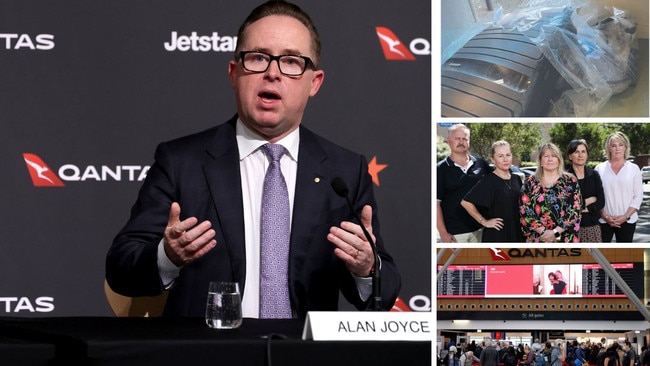
When he announced Qantas’s $2.7bn loss in 2020, a sombre CEO Alan Joyce outlined what a post-Covid world would look like for the airline.
Along with “far fewer employees” Joyce predicted “an economy recovering from deep recession; a customer base with new expectations and structurally different competitors”.
“Simply getting smaller isn’t going to define success in a post-Covid world,” Joyce said on August 20, 2020.
“We’ll have to operate differently in response and that will mean more hard decisions.”
Almost two years later, many travellers would agree Qantas is operating differently.
After outsourcing most of its below-wing operations and cutting more than 9000 employees, Qantas has struggled to meet the expectations of travellers.
Since late March, thousands of bags have been lost, customers have found their accounts charged multiple times for fares and, in several instances, hundreds of passengers have been left stranded overnight at foreign airports after cancelled flights.
The Australian Competition and Consumer Commission is investigating Qantas’s handling of travel credits issued in the place of refunds for flights that never took off. Complaints range from difficulty using the credits, to being charged more for flights when credits rather than cash is tendered. As of July, more than $1bn worth of credits remain outstanding with a use-by date of December 31, 2023.
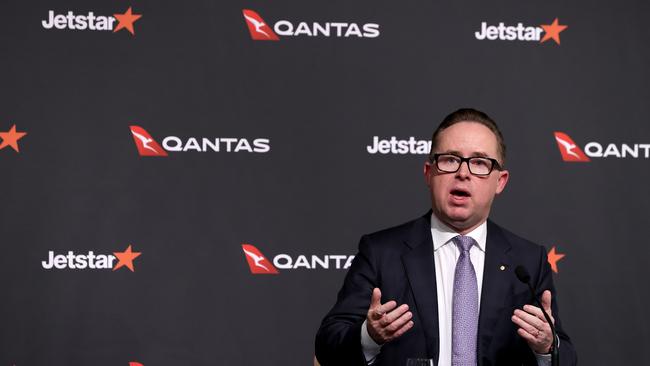
But perhaps most damaging to the airline has been its woeful on-time performance of late.
Prior to the pandemic, Qantas was seen as the country’s most reliable airline, consistently landing and departing around 85 per cent of flights on time, with a cancellation rate of under 2 per cent. Such consistency helped Qantas become the carrier of choice for corporate and business travellers who were not willing to take the risk of running late with a less expensive airline option.
In 2022, as Joyce predicted, things are much different.
Qantas’s on-time performance and cancellation rate has been the worst in the country for the last two months, and on a global scale it does not stack up well.
Aviation analytics site OAG ranked Qantas 92nd out of 130 airlines for on-time performance with more than one in three flights delayed in June.
Its cancellation rate for the month was a grim 7 per cent, amounting to more than 1500 axed services across the 21,753 flights monitored.
Sadly, the monthly figures are not an anomaly with federal government data showing Qantas’s cancellation rate has been the highest in the country since February, and its on-time performance the worst since April.
Virgin Australia performed marginally better, while Rex, with markedly fewer flights, recorded the best results.
For business travellers, the statistics are a disaster with many left scrambling to find alternative flights when their service is cancelled or delayed.
Canberra businessman Michael Monck says after being a loyal Qantas customer for decades he had seriously considered switching to Virgin Australia.
The final straw was a four-leg business trip booked with Qantas, taking him from Canberra to Melbourne, then on to Darwin, to Brisbane and back to Canberra.
After spending around $2000 on fares, Monck was dismayed to learn Qantas had inexplicably scrapped the Melbourne leg from his itinerary. “I’ve spent hours on the phone trying to sort it out,” he said.
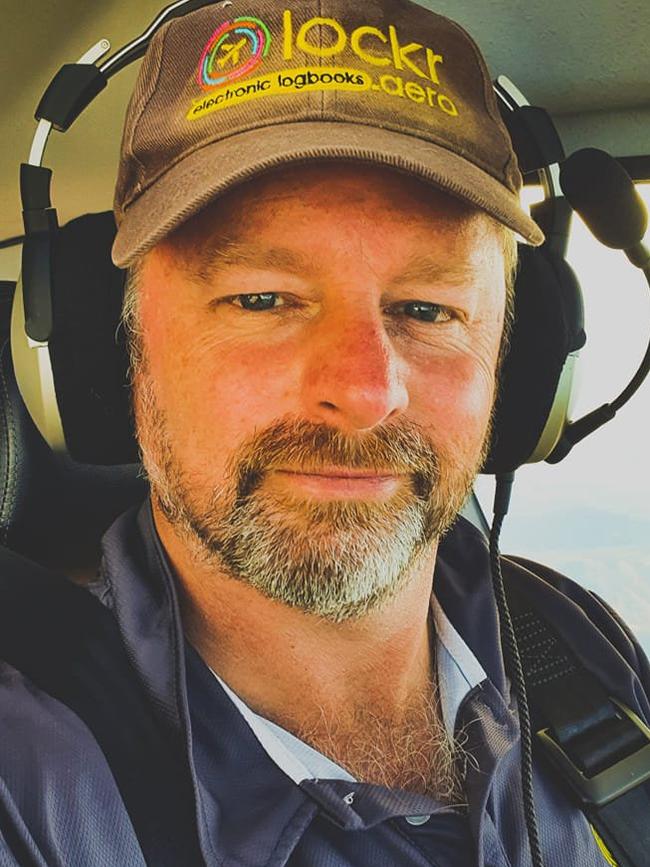
Perth professional Graham Oakley said he was left $1500 out of pocket when the first leg of his domestic booking was cancelled, meaning he was unable to make his second flight.
“Unable to get through to reservations to fix it, I was then forced to pay $1500 to get home,” said Mr Oakley.
“How long do I have to wait for the ‘spirit of Australia” to respond to the complaint I put in?”
Brisbane scientist Georgia Trench had a similarly miserable experience after a flight from London to Sydney (via Singapore) took off three hours late – “without explanation or apology”.
The delayed arrival meant she missed her connection to Brisbane and was told there was not another seat available on a flight for almost 12 hours. “I took the option of flying into the Gold Coast instead. It cost me $175 in an Uber to get home,” said Trench.
“There was always a sense with Qantas that they’d look after you but you just don’t have that sense anymore.”
Melbourne business owner Ryan Walkinshaw resorted to Twitter in an effort to “shame” Qantas over the loss of his bag on a flight from London. Tweeting his ordeal every day to 15,700 followers, Walkinshaw finally received the good news his bag had been located, 19 days after the flight.
The only problem was the bag was almost unrecognisable.
“Qantas are inept,” he posted, alongside a picture of the battered bag with its contents spilling out.
It’s not only customers whose loyalty to Qantas is being tested.
An annual industry survey conducted by unions found only three people out of 2387 respondents said they “fully trusted” the Qantas executive.
Australian Licenced Aircraft Engineers Association federal secretary Steve Purvinas says in 10 years of conducting the survey, staff engagement at Qantas was at its lowest ever point. “Qantas is constantly at war with employees,” Purvinas says.
“It seems to be their sole focus. Passenger needs are disregarded while frontline employees are being blamed.”
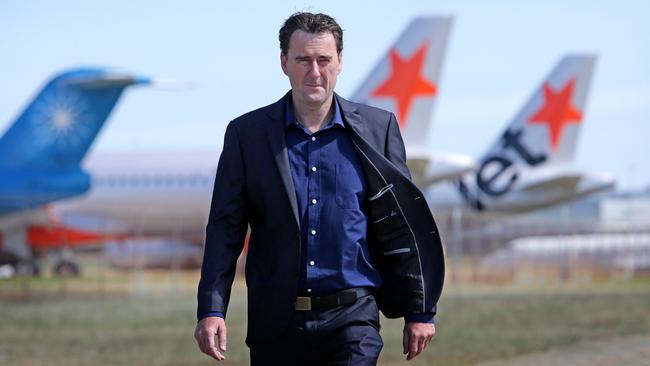
He says many of the issues being experienced by Qantas come down to the fact the workforce has been reduced or outsourced, leaving fewer staff to try to keep up with exploding demand.
“Thirty per cent of engineers were made redundant through Covid. Flying has returned to near normal levels but staff numbers remain 30 per cent behind,” Purvinas say.
“This adds strain to the system making it more likely that critical safety errors will occur.”
At the time of writing ALAEA was balloting members with a view to taking industrial action over their claim for a 12 per cent pay rise.
The move followed four years of negotiations with Qantas, in which time engineers had not received a pay rise.
A Qantas spokesman indicated there was no way the airline would concede to such a claim, describing the pay rise as “unaffordable”.
The airline’s hard line approach to industrial relations has been similarly felt by pilots and flight attendants, in negotiations for new agreements.
Flight Attendants Association of Australia national secretary Teri O’Toole says Qantas had held a “gun to their head” by seeking to have cabin crews’ existing agreement torn up and workers placed on the basic modern award.
Short haul pilots were also presented with an ultimatum in negotiations for an agreement to fly the new domestic fleet, with Qantas telling them if they did not accept the terms, they would find others in the workforce who would.
Australian and International Pilots Association president Tony Lucas says it was essentially a threat to outsource their jobs, with Qantas well aware there were not 700 pilots available in other parts of the company.
“When pilots within the group have their flying given to another entity and that entity needs to recruit others to do that job, there is no other way this can be viewed other than outsourcing,” Lucas says.
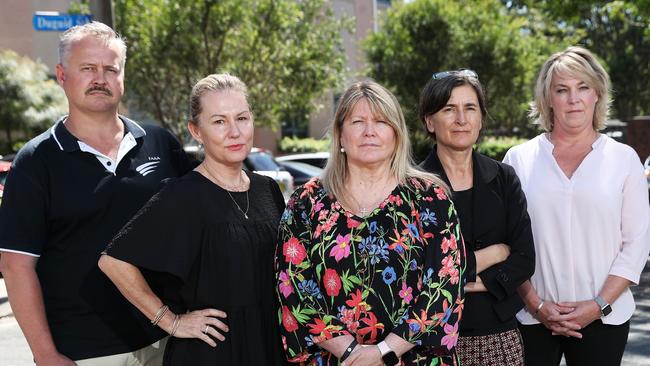
Baggage handlers, ground handling crews and cleaners might suggest other segments of the workforce had it easy, after their jobs were contracted out by Qantas at the height of the Covid crisis.
Qantas insisted the move was a purely commercial decision designed to save $100m a year, but the Federal Court saw things differently and ruled the outsourcing unlawful. An appeal to the Full Federal Court was dismissed, prompting Qantas to apply for leave to appeal to the High Court.
Whatever the outcome, the outsourcing decision could already be seen as backfiring on Qantas with lost and mishandled bags an ongoing nightmare for the airline and its passengers.
O’Toole says there is no question that getting rid of a loyal workforce and replacing them with low-paid employees of other companies was ever going to produce the same results.
She pointed to a recent incident, in which a ground handling vehicle struck a Qantas Boeing 737 at Melbourne Airport but the driver did not bother to report it.
It was only that the pilot noticed two sizeable dents in the fuselage during a walkaround and raised the alarm.
“That’s the difference between having employees who understand that at Qantas safety is the highest priority and contract workers who are on $21 an hour, who just want to get through their shift and go home,” O’Toole says.
“If that plane had taken off it could’ve been a disaster.”
Qantas denied there was any risk, saying the ground handling supervisor reported the incident within minutes of it occurring.
CEO Alan Joyce is currently out of the country on leave.
Instead a Qantas spokesman suggested the airline had addressed all the issues raised including large numbers of mishandled bags, difficulty getting customer service and poor
on-time performance.
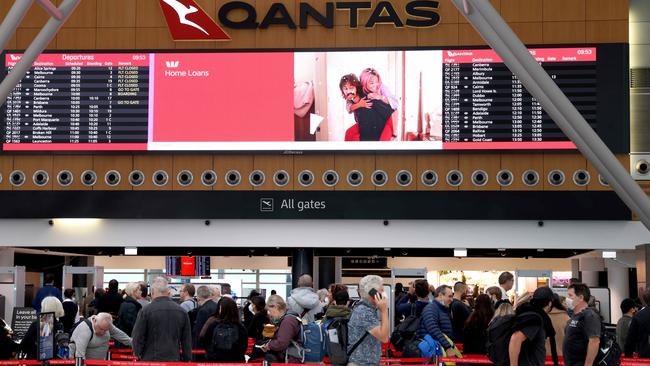
He pointed to recent comments by Joyce that many of the problems being experienced by Qantas were not exclusive to the airline, but rather a global issue for the industry.
In an interview on Perth radio last month, Joyce conceded “we are absolutely not delivering the service that we would expect to do”.
“It is a process of restarting the aviation industry that has been grounded for two years, and there are resource constraints across the whole supply chain of airports, airlines, catering across manufacturers and supply parts,” he said.
“Now that’s no excuse for a customer that doesn’t have their bags, doesn’t get their flight going on time, we recognise it and we are putting a huge amount of resources into making sure it gets better as fast as possible.”
Qantas claimed to have already reduced call waiting times at its contact centres from two hours to an average of six minutes, following intensive recruitment.
Instances of repeatedly charging customers for a single booking were attributed to customer error, or call centre staff inadvertently processing a booking multiple times.
And a spokesman denied Qantas made it difficult to use travel credits insisting the airline “absolutely wanted customers to use them”.
Somewhat remarkably, the litany of problems facing the airline is yet to have any significant impact on Qantas’s financial performance with market analysts sharing the view the company is on the right track.
A recent note by J.P. Morgan analyst Anthony Longo rated Qantas as a “key sector pick given its exposure to travel recovery, strong market share, balance sheet strength and resilient and cash-generating Loyalty (frequent flyer) division”.
“The airline industry is in the midst of its greatest ever challenge,” Longo observed.
“Against this backdrop we see Qantas as being well positioned given it has taken material costs out of its business – around $1bn a year; it has a high proportion of earnings from domestic and loyalty and a more favourable competitive position, both domestically and internationally.”
Jarden Group analyst Jakob Cakarnis noted that Qantas’s reduction in domestic flight capacity in response to higher fuel prices would produce a stronger return per seat. Combined with a highly disciplined approach to cost management, the airline was firmly on track for an underlying profit in the year to June 30, 2023.
As trying as recent months have been, Alan Joyce was forecasting a “rapid improvement” for customers booking and flying with the airline, thanks to more staff and fewer flights.
He emphasised the issues were by no means exclusive to Qantas, pointing to horror stories of 18,000 mishandled bags at Heathrow Airport, and 100 grounded aircraft in the US due to a pilot shortage.
“The issue is all over the globe. It’s worse in North America and Europe,” he said.
“No comfort to our customers who are experiencing it, but we are fixing it and it will be fixed very rapidly.”
In Monck’s case, Qantas did eventually fix his problem - three weeks after he complained.
“It took a while but we got there in the end. The lady who called apologised profusely and they’ve issued more travel credits,” he said.
“I certainly hope this is a turning point for them.”




To join the conversation, please log in. Don't have an account? Register
Join the conversation, you are commenting as Logout